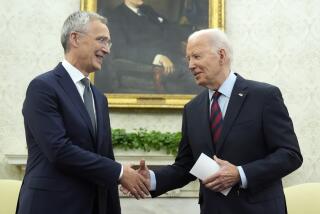Protection Is NATO’s No. 1 Goal
- Share via
As NATO intensifies its air campaign against Yugoslavia, refugees in the tens of thousands continue to pour out of Kosovo into neighboring Albania and Macedonia. As of this week an estimated 675,000 Kosovar Albanians had fled the province under pressure from marauding Serbian troops operating on orders from Belgrade. Several hundred thousand more ethnic Albanians have been driven from their homes but have not yet been able to escape Kosovo. Gen. Klaus Naumann, the retiring chairman of NATO’s military committee, believes that President Slobodan Milosevic’s brutal effort to expel all ethnic Albanians from Kosovo “appears achievable.” NATO’s most urgent long-term task is make sure that Milosevic’s success does not become irreversible.
NATO has set a number of conditions for suspending the bombing that is systematically destroying Yugoslavia’s infrastructure and--less visibly--reducing its war-fighting capability. Its most important demands are that all Serbian army and paramilitary forces leave Kosovo and that an international force move in to oversee the refugees’ return and assure their security. Those demands cannot be compromised. It is inconceivable that any Serbian soldiers or police should be allowed to remain after the record of murder, rape and pillage they have compiled. The place for these enforcers of their regime’s “ethnic cleansing” policy is not in Kosovo but in The Hague, facing an international war crimes tribunal.
Milosevic continues to resist these demands, knowing where they would inevitably lead. If Kosovo becomes the international protectorate that NATO envisions, there seems little chance that control from Belgrade would be restored any time soon, or perhaps ever. The survivors among the 90% of the Kosovo population that is ethnic Albanian are sure to insist on self-determination, and no doubt they would have a lot of international support. At a minimum that would mean a restoration of the broad autonomy that Kosovo was first granted in 1974. More likely it would lead to demands for independence or, more problematic, union with Albania.
The political or territorial consequences to Yugoslavia of Milosevic’s folly are not NATO’s immediate concern. The alliance intervened in the Balkans, first in Bosnia-Herzegovina and now in Kosovo, because it feared that the Milosevic-instigated conflicts would quickly threaten the stability of neighboring states. That is happening, as Macedonia and Albania especially stagger under the weight of Europe’s greatest refugee crisis since World War II.
NATO’s insistence on the return of the refugees to their homes under the protection of an outside armed force is and must remain nonnegotiable. While the bulk of that protection, to be credible, must come from NATO ground forces, there is room for broader participation. That includes Russia’s, provided that Moscow agrees that the central purpose of the mission is not to prepare for a restoration of Yugoslavia’s sovereignty but to assure that all Kosovars, ethnic Albanians as well as the Serbian minority, are able to live in peace and security.
More to Read
Sign up for Essential California
The most important California stories and recommendations in your inbox every morning.
You may occasionally receive promotional content from the Los Angeles Times.









